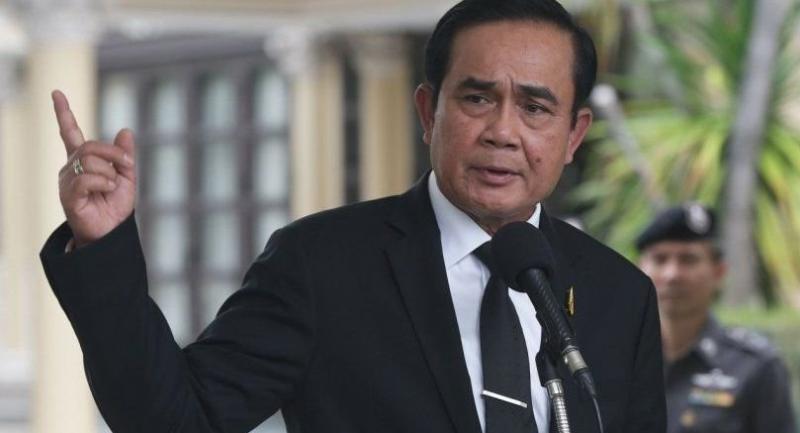Prayut casts doubt on parties’ role in poll date

QUESTIONS RAISED ABOUT PARTICIPATION AND PM’S DEMAND THAT PLATFORMS CARRY ON JUNTA WORK
THE government may need to go it alone in choosing the election date if political parties failed to “cooperate” and take part in a meeting to be held in June, Prime Minister General Prayut Chan-o-cha said yesterday.
In June, political party representatives are expected to meet the National Council for Peace and Order (NCPO) and its appointed constitutional drafters and legislators to discuss holding the next election.
Also in the same month, all four organic laws essential for the election are to be announced in the Royal Gazette, paving the way for the country’s first general election in over four years after the May 2014 coup.
“We’ll have to find a conclusion as much as possible. Whichever party wishes to come is welcome,” Prayut said during his weekly press briefing at Government House.
“We have to hold the election eventually. Without cooperation, we will have to set the date on our own. How hard would that be?” he said.
Political parties would also be expected to explain how they would continue work initiated by his junta government, Prayut added. “They can’t have nothing in hand and get elected just like that,” he said.
While parties would not be expected to elaborate on their policies in front of the junta, Prayut said they should be able to “answer how problems can be solved”.
“They can reveal their policy platforms afterwards. I don’t expect to hear them,” he said.
“Political parties’ policies can’t make changes to the country because they benefit just certain groups of people. Hasn’t it been carried on in that way? The rice-pledging scheme, for instance. Who was it made for? Have they ever been responsible for the burden on the national budget?” he asked rhetorically.
The premier was apparently referring to the rice-pledging scheme carried out by fugitive former prime minister Yingluck Shinawatra’s government. Last year, Yingluck was sentenced to five years’ imprisonment in a court case that stemmed from the project. Some of her Cabinet members and businesspeople involved in the project are facing lengthy jail terms and hefty fines.
Democrat Party key member Ongart Klampaiboon said the party might have to see an official invitation before deciding whether to join the discussion.
“The Democrat Party is more than willing to help contribute if the discussion will yield something for the country,” he said in reference to Prayut’s comments. “However, I’m not sure what this discussion will be about, because the topic keeps changing.”
The veteran politician also noted that scheduling the election date was normally the responsibility of the government and the Election Commission (EC). He said he was not sure what role political parties would play in that matter, as they had never previously had any involvement.
Pheu Thai Party politician Korkaew Pikulthong said yesterday that his party saw no need to join a discussion with the government regarding the election date.
“Determining the election date is the job of the EC and government,” said the former MP. “This government has failed to keep its promise [about the next election]. We’ll have to keep following up this issue,” he added.
Korkaew also said it was not the government’s business to discuss with political parties about their policy platforms. They had the freedom to formulate policies to satisfy voters and get elected, he added.
Prayut yesterday reiterated the so-called political road map was still valid despite the increasing possibility that the last two organic laws required for an election would be submitted to the Constitutional Court for review.
While the two laws have already been approved, a court decision on whether they violate the charter would mean that the legislative process could take longer and result in an even longer delay before the election.
Concerns
“It can happen by legal procedure. We have the court. Otherwise the court would have no work to do,” Prayut said.
He also insisted that the National Legislative Assembly (NLA) should take care of the task. “They haven’t sent them back to [the government]. Don’t throw it to us,” he added.
Meanwhile, chief constitution drafter Meechai Ruchupan yesterday said he would not formally recommend to the prime minister that he seek a Constitutional Court ruling on the contentious MP election bill, despite concerns that its constitutionality issue may hamper the next election.
Some observers, including lawmakers, pointed to certain provisions deemed to be in conflict with the Constitution and they warned that the issue could fail the political road map and lead to an indefinite delay in the election.
The election bill allows people with special needs to be assisted by polling-booth officials in casting their votes. For many, this goes against the Constitution, which requires ballots to be cast in secret.
Meechai, chairman of the Constitution Drafting Commission (CDC), said yesterday it would not be a problem as long as such unusual voting did not happen in too many constituencies, and nobody raised the issue at the Constitutional Court.
However, Jade Donavanik, a law expert and advisor to the CDC, told The Nation that the legislation should be based on a broader interpretation, meaning it should not leave anything to chance.
He said the bill should be scrutinised by the Constitutional Court for the best clarity possible.
Members of the NLA, meanwhile, have insisted on not taking the bill to the court. In their view, it should not be a problem. Also, hey did not want a judicial review to put off the election further.
